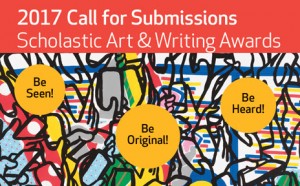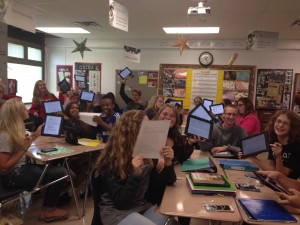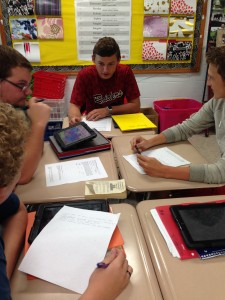 English 9 began our first literary circles today! Now this is what English and Literature is all about; enjoying good books together.
English 9 began our first literary circles today! Now this is what English and Literature is all about; enjoying good books together.
Today in class we reviewed the power of working in small collaborative groups to better understand the books we are reading. We call these groups literary circles.
Welcome to English 9 Literary Circles
One of the most important steps in becoming a strong reader is understanding that learning must be student centered (Brooks & Brooks 1993). You as students must be at the heart of the learning process, and must be active participants in your own learning, not passive recipients of information that will not embed itself in the right places of your mind to become useful later on.
What are Literature Circles?
“In literature circles, small groups of students gather together to discuss a piece of literature in depth. The discussion is guided by students’ response to what they have read. You may hear talk about events and characters in the book, the author’s craft, or personal experiences related to the story.”
What is its purpose?
“Literature circles provide a way for students to engage in critical thinking and reflection as they read, discuss, and respond to books. Collaboration is at the heart of this approach. Students reshape and add onto their understanding as they construct meaning with other readers. Finally, literature circles guide students to deeper understanding of what they read through structured discussion and extended written and artistic response.”
Literature Circles are a powerful process of bringing texts to life. It is built on the notion of the power of conversation to engage, to dig deeper, to connect, to analyze, to synthesize, to create.
We also reviewed the roles that each student will preform within their literacy circle:
Discussion Director: Your job is to develop a list of questions that your group might want to discuss about this part of the book. Don’t worry about the small details; your task is to help people talk over the big ideas in the reading and share their reactions. Usually the best discussion questions come from your own thoughts, feelings, and concerns as you read. You can list them below during or after your reading. You may also use some of the general questions below to develop topics for your group.
Summarizer: Your job is to prepare a brief summary of today’s reading. Your group discussion will start with your 1-2 minute statement that covers the key point, main highlights, and general idea of today’s reading assignment
Connector: Your job is to find connections between the book your group is reading and the world outside. This means connecting the reading to your own life, happenings at school or in the community, similar events at other times and places, or other people or problems that this book brings to mind. You might also see connections between this book and other writings on the same topic or other writings by the same author. There are no right answers here. Whatever the reading connects you with is worth sharing!
Vocabulary Enricher: Your job is to be on the lookout for a few especially important words in today’s reading. If you find words that are puzzling or unfamiliar, mark them while you are reading and then later jot down their definition, either from a dictionary or from some other source. You may also run across familiar words that stand out somehow in the reading – words that are repeated a lot, are used in an unusual way, or provide a key to the meaning of the text. Mark these special words, and be ready to point them out to the group. When your circle meets, help members find and discuss these words.
Investigator: Your job is to dig up some background information on any topic related to your book. Choose one of the following. Once one of the following investigations has been done by a group member, you must choose from the remaining investigations. Place a check by ones that have been done.
- the geography, weather, culture, or history of the book’s setting
- information about the author – her/his life and other works
- information about the time period portrayed in the book
- pictures, objects, or materials that illustrate elements of the book
- the history and derivation of words or names used in the book
- music that reflects the book or its time
This is not a formal research report. The idea is to find bits of information or material that helps your group better understand the book. Investigate something that really interests you – something that struck you as puzzling or curious while you were reading.
Travel Tracer: When you are reading a book in which characters move around often and the scene changes frequently, it is important for everyone in your group to know where things are happening and how the setting may have changed. So that’s your job: to track carefully where the action takes place during today’s reading. Describe each setting in detail, either in words or with an action map or diagram you can show to your group. You may use the back of this sheet or another sheet. Be sure to give the page locations where the scene is described.
Role sheets are provided in the resources section of your Canvas course. Everyone copied and pasted the research role sheet for the role they have been assigned for the first week of reading. Grades during the literacy circles will be earned from individual role sheets (that will be turned in at the end of each literary circle meeting) and book tests. Some of the book test questions will come directly from the role sheets turned in.
Our first literacy circle meeting will take place next Thursday in English class.
A portion of class today was also devoted to reminding all students of the following important items:
Week 2 Vocabulary Test is tomorrow.
- Come to class with a charged iPad
- Study the meanings of the words.
- Be able to explain in your own words the difference between the word diffuse and the word digress.
- Understand how to use the words in sentences.
SRI Assessment is also tomorrow.
- SRI stands for Scholastic Reading Inventory.
- This measures your reading level and should be taken seriously.
- Students not demonstrating a grade level appropriate reading level will continue with SRI throughout the school year.
Anytime left in class tomorrow will be used for SSR, which means Silent Sustained Reading. During SSR students are expected to read for the entire time allowed. Some students will have more time than others because of the amount of time they spend on the two assessments. Whether the individual student has 5 minutes or 25 minutes of class time remaining after taking both assessments they will read silently the entire time.



